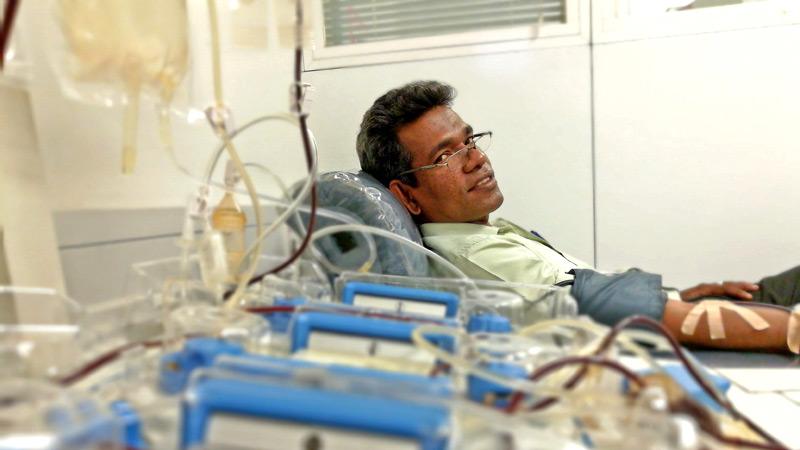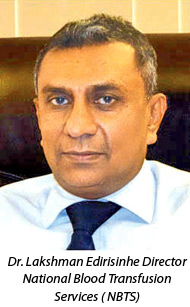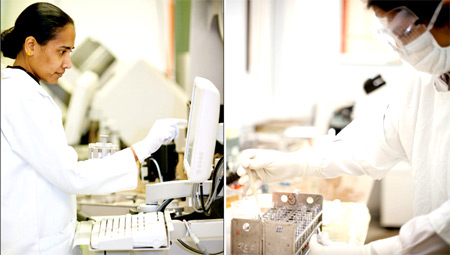
Despite the many problems which arose during the Covid-19 pandemic, the National Blood Transfusion Service (NBTS) has successfully performed its uphill task of supplying the nation’s demand of blood and blood products without a break. However the Bank’s officials say that they are now facing new challenges due to the severe shortage of foreign reserves and inflation which has crippled the country’s economy. According to Director of NBTS, Dr Lakshman Edirisinghe, The NBTS collects about 400,000 units of blood and blood products annually from voluntary, non-remunerated donors, of which about 85 percent is from Mobile Donation Campaigns. “However limited resources and dwindling supply of consumables due to the current economic crisis has severely hindered organising Mobile Blood Donation Campaigns Islandwide”, he said in an interview with the Sunday Observer.
 To get more insights into the working of the Bank; what the Bank’s requirements for blood transfusions are on a daily basis; and whether demand for blood has risen in recent months due to the Covid pandemic as well as rising road accidents with patients requiring transfusions , the Sunday Observer, spoke to Dr. Edirisinghe ahead of World Blood transfusion Day which falls on June 14. We also asked him how the blood is collected , how safe such voluntary donations were , and most importantly the health benefits of donating one’s blood for the donor and the recipient. In addition we asked him how the National Blood Transfusion Service has been able to perform so well under trying circumstances escalated by the economic crisis and prevailing political instability.
To get more insights into the working of the Bank; what the Bank’s requirements for blood transfusions are on a daily basis; and whether demand for blood has risen in recent months due to the Covid pandemic as well as rising road accidents with patients requiring transfusions , the Sunday Observer, spoke to Dr. Edirisinghe ahead of World Blood transfusion Day which falls on June 14. We also asked him how the blood is collected , how safe such voluntary donations were , and most importantly the health benefits of donating one’s blood for the donor and the recipient. In addition we asked him how the National Blood Transfusion Service has been able to perform so well under trying circumstances escalated by the economic crisis and prevailing political instability.
Excerpts
Q: Sri Lanka is a country which requires blood for a variety of reasons such as patients undergoing surgical procedures, rising road accidents requiring transfusions, Chronic diseases including malignancies, Thalassaemia and Haemophilia. As such, how many pints of blood in normal circumstances do you need on a daily basis island wide as an average?
A. We always maintain adequate stocks to cater to our patients’ requirements under any circumstance. However, with the prevailing situation in the country, it has become a challenging task to maintain the minimum requirement. It needs an extra effort with a lot of additional work to keep the balance between supply and demand which is about 1100 per day.
Q: What is the estimated number of donors you have at present?
A. 800,000.
Q: Are they all voluntary donations?
A. Yes all are voluntary, non-remunerated donors.
Q: In normal circumstances, what is the average amount of blood that hospitals need per day or month?
A. Island-wide data in normal circumstances.
RCC 900 to 1100 units per day
Platelets 400 to 500 units per day.
Q: How much blood can a person give in a single donation and how often? Does it depend on his/her age, health status etc.?
A. A person can donate a standard volume of 450ml once every 4 months. However, the eligibility to donate depends on the age and health status.
Q: So does that mean someone with underlying chronic diseases like diabetes, hypertension, cholesterol and heart ailments will not be allowed to donate blood?
A. Apart from donors with controlled cholesterol, donors with above mentioned conditions won’t be eligible.
Q: Why the restrictions if the person wants to donate more?
A. The standard blood pack we use is designed only to contain 450ml of blood and the amount of anticoagulant added is to match that volume only. On the other hand, by bleeding various volumes depending on the weight of the donors, we will not be able to maintain the standard and the quality of blood and blood products.
Q: How do you prevent wastage of blood that may become outdated if not used within a specific time?
A. Different blood components have different shelf life.
 Platelets – 6 days
Platelets – 6 days
Red Blood Cells- 35-42 days
Fresh Frozen Plasma – 1 year
We are using several measures to prevent the wastage of blood.
Blood components collected earliest will be issued first. (First In First Out Method)
The entire NBTS is a centrally coordinated system and we have a dedicated Stock Management Team who daily reviews the existing blood stocks of all blood banks and coordinates the distribution of close expiry products to where it will be needed.
The world acceptable level of wastage is less than 5 percent, but it’s in our blood service is around 2%.
Nowadays our stock management team maintains it less than 2 percent by using above strategies.
Q: What is the ideal age group for blood donations?
A. Eighteen years to fifty-five years.
Q: What about elders who are healthy?
A. Donors who are up to 60 years can donate if they are regular donors and properly screened for non-communicable diseases.
Q: Can children under 12 years of age donate blood? If not, why not?
A. No. This is because they are in the growing and development age bracket. Hence, they are not considered physiologically suitable according to the standards set for blood donations.
Q: How many lives can a single donation of blood save?
A. 2-5 lives.
Q: Who are those who fall into the category of those who need blood more often than others?
A. These are some of the categories who need blood more often than others. Patients who are transfusion dependent (Hematological malignancies, Thalassemia, Hemophilia, Chronic Kidney Disease and pregnant mothers
Q: Since all sorts of people donate blood and sometimes there isn’t enough time for the Bank personnel to check every single donation, is it possible that some of the blood we get could be contaminated?
A. First of all this question is inappropriate. The NBTS only recruits 100% voluntary, non-remunerated donors. For each and every donation the donor will be extensively counselled by a well-trained Medical Officer. Each donation will be tested for specific Transfusion Transmissible Infections at selected centres across the country before they are ready to use for patients. Hence, we have minimised this so-called “contamination”.
Q: Does that mean that the blood we get is hundred percent pure?
A. As I said earlier, we at the NBTS take all precautions to issue the safest blood or blood component to the patient. I must emphasize that quality and safety of all products are equally maintained throughout the country irrespective of the geographical location.
Q: Benefits to the donor – health wise and otherwise – what are they?
A. To the donor the most powerful health benefit is arguably in the psychological well-being.
Iron stores are regulated and many organs of the body are thus benefited such as the liver and heart. Donating blood is good for you, and it’s even better for all the people who desperately need the help. Also the donor receives a free health checkup each time he/she donates.
Q: What are the benefits of blood donations to the patient?
A. Many patients need blood to save their lives. Thalassemia, leukaemia, lymphoma and most other cancer patients on various medications need blood and blood products. Pregnant mothers with post-partum haemorrhage, patients in shock following trauma and all patients undergoing major surgeries can be saved with blood transfusions. Patients with Chronic Kidney Disease and those experiencing severe complications from Dengue can also be saved from a blood transfusion.
Q: Do blood donations require hospital settings? Or can they be given in mobile clinics and makeshift tents as long as they are done in sterile conditions?
A. No. Hospital conditions are not required. More than 85 percent of our routine collections are done through mobile blood donations campaigns as stated above.
Q: So are these outreach mobile blood collecting camps you referred to conducted under medical supervision?
A. Definitely yes.
Q: Are there special requirements for people who have worked abroad and may have returned with some sexually transmitted diseases to avoid passing on those infections to others if they donate blood?
A. As I mentioned above, we have an extensive pre-donation counselling program comprising of the doctor and donor as well as a comprehensive Transfusion Transmissible Infection screening. Apart from that if a donor has travelled abroad, he/she will be deferred from donating for 3 months from the date of arrival as well as if this person has visited a Malaria Endemic Country then he/she will be deferred for three years.
Q: Which authority is responsible for the overall management of blood donations island wide? What role does it play?
A. The National blood transfusion service. It is responsible for the development and implementation of Blood Inventory Management Guides and the National Blood policy in Sri Lanka. In addition, it also provides technical and clinical expertise on the subject. It is the apex body overlooking all regulatory matters related to blood and blood products in both public and private sectors in Sri Lanka.
Q: Are blood donations part of a strategic national development plan?
A. Yes, it is a national requirement for any country in that matter.
Q: Despite the many problems which arose during the Covid-19 pandemic. I understand that the National Blood Transfusion Service (NBTS) has been a success in its uphill task of supplying the nation’s demand for blood and blood products without a break. What is the goal of the National Blood Transfusion Service in the future?
A. To be the leader and the best service provider in the National Transfusion Services in the Southeast Asian region.
Q: Is there a definite date for achieving your goal?
A. We are on a five-year plan to achieve this height if other conditions in the country are favourable for us to achieve the target.
Q: Despite the many problems which arose during the Covid-19 pandemic. I understand that the National Blood Transfusion Service (NBTS) has been a success in its uphill task of supplying the nation’s demand for blood and blood products without a break.
Q: Any hotlines for a person wishing to donate blood at his/her nearest centre?
A. The required information can be obtained from our Nursing Officers and Public Health Inspectors. Call 0115332153/0115332154
Q: Any message to our readers on why blood donations are so important ?
A. Blood is a precious resource that must be carefully managed to ensure that each donor’s gift provides the greatest benefit to patients. It is essential to increase collections when the demand is high, and it is equally important to limit collections when the blood stocks are adequate, hence preventing wastage of blood. Hence The National Blood Centre and each Cluster Blood Centre makes a pre-estimation about the number of mobile blood camps and the number of donors and decides about the production of blood components to match the national requirement.
Once a donation takes place, blood and components have a limited lifespan, and the person is not suitable to donate for another four months. The most important point is that there are no other substitutes for blood. Therefore, the National Blood Transfusion Service of Sri- Lanka is committed to optimize blood collection, production, blood inventory management, provision and transport to meet the statistically and scientifically predicted patient needs while minimising resource wastage. So do not be disheartened if you are requested to donate on a later date simply due to adequate stocks in hand.
